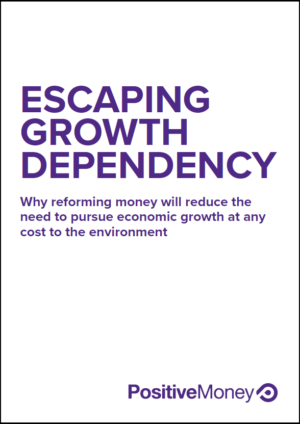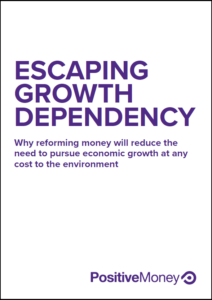Escaping Growth Dependency


A finite planet cannot sustain an ever-growing economy, and the effects of environmental degradation are already becoming alarmingly manifest. But governments around the world make growth their overriding economic objective. Why are governments so set on a policy that seems destined to destroy the environment and ecosystems on which we all depend?
PDF Download:
Download Full Report Here (Free, PDF, 67 pages)
There are several factors that drive governments to think growth is both beneficial and essential, and to think that a number of social and economic problems would arise if we didn’t pursue economic growth at all costs. These social, political, or economic factors make governments feel they have no option but to pursue never-ending economic growth.
Because these factors make us dependent on the pursuit of endless economic growth, we have named them ‘sources of growth dependency’. We identify a number of these sources of growth dependency.
We take a detailed look at one source of growth dependency: the role of the current monetary system in creating high levels of private and government debt. High levels of public and private debt create the pressure for ongoing economic growth. We identify how reforms of the monetary system can tackle this problem to reduce this source of growth dependency.
But if governments are to be persuaded to abandon the pursuit of endless economic growth as an overriding policy objective, it will be necessary to find other, non-growth solutions to these problems. Addressing all the sources of growth dependency would reduce the pressure for endless economic growth and open the door to an economy that operates within the limits of nature.
Why debt is a source of growth dependency
The design of the current monetary system, in which banks create the majority of new money when they lend, tends to generate high levels of private debt (debt of households and businesses) and high levels of public debt too. Our report argues that public debt and the resultant waste on interest payments lead to higher inequality and worries about the financial health of the government. High private debt, on the other hand, is the primary cause of banking crises like the 2007-08 recession, and acts as a drag on the economy even in ‘good times’.
We show that to avoid these negative effects of debt, governments have very few good options other than to try and grow the economy. At low levels of growth, interest payments are unmanageable and agents have to take on more debt to cover them.
How to escape debt-driven growth dependency
The inherent instability of our monetary and financial system and the problems associated with it are, to an extent, already recognised by regulators and other authorities. But their answer to this problem has been to add ever-more complex regulation. Instead, we would suggest two simpler but more radical proposals:
Adding a new tool to the Bank of England’s toolkit: ‘sovereign money creation’ (or ‘monetary financing’)
Preventing banks from creating money altogether, and fully decoupling money as means of payment from money as a source of credit. This can be done by switching to a ‘sovereign money system’.
Neither of these innovative policies alone will be sufficient to transition to a steady state economy where ecosystems are protected. However, both can provide governments with tools to tackle all other sources of growth dependency, so there is then no excuse about getting to the root of some of these causes.